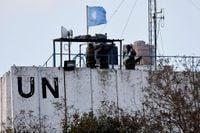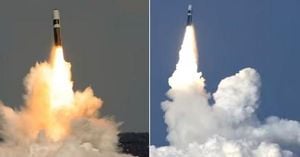On a quiet Tuesday afternoon in the border town of Naqoura, southern Lebanon, an unexpected incident jolted the headquarters of the United Nations Interim Force in Lebanon (UNIFIL). An Israeli drone, unarmed but equipped with a camera, crashed directly into the peacekeeping compound. Remarkably, no casualties were reported, and the situation was swiftly brought under control by UNIFIL’s explosive ordnance disposal experts, who neutralized the device immediately after impact.
The incident, which occurred on September 23, 2025, has renewed anxieties over the fragile calm in this highly volatile region. According to the Associated Press, the Israeli military later confirmed the drone belonged to them, though it offered no public explanation for the crash or the drone’s mission in Lebanese airspace. The drone’s presence, however, has stirred up a hornet’s nest of diplomatic concerns, not least because such flights are a direct violation of U.N. Security Council Resolution 1701. This resolution, adopted in 2006 to quell a previous round of fighting, explicitly calls for both Israel and Lebanon to respect each other’s airspace.
UNIFIL, in a statement echoed by multiple outlets including Daily Times and AP, emphasized the gravity of these violations. "Israeli drone flights over Lebanon violate U.N. Security Council Resolution 1701, which calls on both sides to respect each other's airspace," the peacekeeping mission stated. The force further noted that while its personnel are trained and prepared to respond to threats, "this device fell on its own." The calm response from the peacekeepers belied the growing sense of unease in the region, where even a minor miscalculation can have outsize consequences.
This was not an isolated incident. Just two weeks prior, UNIFIL reported that Israeli drones had dropped four grenades near peacekeepers clearing roadblocks in southern Lebanon, close to the Israeli border. Thankfully, there were no injuries in that episode either, but the proximity of the blasts to UN personnel raised serious questions about operational safety and intent. UNIFIL expressed "serious concerns over the safety of its personnel and the increasing frequency of such confrontations," warning that repeated violations risk further destabilizing the already precarious peace.
The context for these events is a region still reeling from the most recent Israel-Hezbollah war, a conflict that reignited on October 8, 2023. That day marked a dramatic escalation: Hezbollah began launching rockets across the border just a day after a deadly Hamas-led incursion into southern Israel set off the ongoing war in Gaza. Israel responded with a barrage of shelling and airstrikes targeting Lebanon, and the two sides quickly became embroiled in a cycle of escalation that, by late September 2024, had erupted into a full-blown 14-month war.
The human and economic toll of that conflict has been staggering. According to the World Bank and corroborated by the Associated Press, more than 4,000 people in Lebanon—hundreds of them civilians—lost their lives. In Israel, the death toll reached 127, including 80 soldiers. The destruction in Lebanon alone was estimated at a jaw-dropping $11 billion, a figure that underscores the scale of devastation wrought during those 14 months of hostilities.
Resolution 1701, the linchpin of the post-war ceasefire, was intended to prevent this very kind of escalation. It called for a cessation of hostilities, the withdrawal of Israeli forces from southern Lebanon, and the deployment of UNIFIL to help the Lebanese armed forces maintain peace and security. Crucially, it also mandated that both sides respect each other's territorial integrity—including airspace. Yet, as the events of September 2025 demonstrate, the lines remain perilously blurred.
UNIFIL’s role in this fraught environment is both vital and precarious. The peacekeepers are tasked not only with monitoring the cessation of hostilities but also with mediating between two deeply distrustful neighbors. Their presence is meant to act as a buffer, but as recent incidents show, their own safety is far from guaranteed. "Such incidents risk escalating tensions in an already volatile area," UNIFIL warned, highlighting the delicate balance that must be maintained to prevent a return to open conflict.
The Israeli military’s silence on the cause of the drone’s crash has left many questions unanswered. Was it a technical malfunction, or did it stray off course during a surveillance operation? The drone was confirmed to be unarmed and fitted with a camera, suggesting it was intended for reconnaissance rather than attack. Still, the mere act of entering Lebanese airspace—especially given the history and the explicit prohibitions of Resolution 1701—has been enough to raise hackles on both sides of the border.
For residents of southern Lebanon, the sight of drones overhead is an unwelcome reminder of the region’s vulnerability. Many here still bear the scars—physical, emotional, and economic—of the last war. The knowledge that a simple technical error or misjudgment could trigger a new round of violence is a heavy burden. For Israeli officials, the need for intelligence gathering is often framed as a matter of national security, particularly with Hezbollah’s military capabilities growing ever more sophisticated. Yet, these justifications do little to assuage the fears of those living in the shadow of the border.
International observers have repeatedly called for renewed commitment to Resolution 1701 and for both Israel and Lebanon to exercise restraint. While the peace has held—albeit tenuously—since the end of the 2024 conflict, the recent spate of drone incidents is a stark reminder of how quickly the situation can deteriorate. Each violation, no matter how small, chips away at the trust and stability that UNIFIL and the broader international community have worked so hard to build.
As the dust settles in Naqoura, the message from UNIFIL is clear: the peace remains fragile, and the risks of escalation are ever-present. For now, the quick actions of the peacekeepers have averted tragedy. But with tensions simmering and both sides wary, the next incident may not end so quietly.




